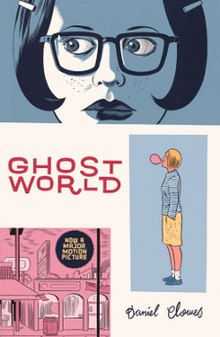Ghost World
| Ghost World | |
|---|---|

The latest cover art for Ghost World
|
|
| Creator | Daniel Clowes |
| Date | 1997 |
| Publisher | Fantagraphics Books |
| Original publication | |
| Published in | Eightball |
| Issues | 11–18 |
| Date of publication | Sep 7, 1993 – Apr 19, 1997 |
| Language | English |
| ISBN |
(hardcover) (softcover) |
Ghost World is a graphic novel by Daniel Clowes. It was serialized in issues #11–18 (June 1993 – March 1997) of Clowes's comic book series Eightball, and was published in book form in 1997 by Fantagraphics Books. It was a commercial and critical success and developed into a cult classic.
Ghost World follows the day-to-day lives of best friends Enid Coleslaw and Rebecca Doppelmeyer, two cynical, pseudo-intellectual, and intermittently witty teenage girls recently graduated from high school in the early 1990s. They spend their days wandering aimlessly around their unnamed American town, criticizing popular culture and the people they encounter while wondering what they will do for the rest of their days. As the comic progresses and Enid and Rebecca make the transition into adulthood, the two develop tensions and drift apart.
A darkly written comic, with intermittently sombre explorations of friendship and modern life, Ghost World has become renowned for its frank treatment of adolescence. The comic's success led to a movie adaptation of the same name, released in 2001 to critical acclaim and numerous nominations, including a nomination for the Academy Award for Writing Adapted Screenplay, written by Clowes and Terry Zwigoff.
Ghost World takes place in an unnamed town filled with shopping malls, fast food restaurants, and urban sprawl. The town plays a key part in the narrative, as it is constantly mocked and criticized by Enid and Rebecca. As the story progresses, the background changes dramatically. The phrase "Ghost World" is seen by the characters several times, painted or graffitied on garage doors, signs, and billboards for an undeclared reason. The term can also apply to the way in which both Enid and Becky, but especially Enid, are haunted by the past. In the special features of the film adaptation, it is said to refer to the fact that the town's individuality is being encroached upon by franchises that are seen everywhere.
...
Wikipedia
